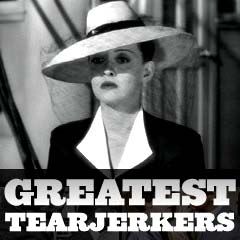|
The Greatest Tearjerkers of All-Time
|
|
Title Screen
|
Movie Title/Year and Brief Tearjerker Scene Description |
Screenshots
|

|
Star Trek II: The Wrath of Khan
(1982)
- the death scene of Captain Spock
(Leonard Nimoy), who had just sacrificed his life (after being exposed
to radiation) to save the doomed U.S.S.
Enterprise from a deadly explosion. Before Spock went to his
death, he transferred
his katra -- his memories and experience -- to Dr. Leonard "Bones" McCoy
(DeForest Kelley) with the word "Remember." He
reassured Admiral James T. Kirk (William Shatner) as he died: ("Don't
grieve, Admiral. It is logical. The needs of the many outweigh (the
needs of the few). Or the one. I never took the Kobayashi Maru test,
until now. What do you think of my solution? (Spock knelt down) I
have been, and always shall be, your friend. (Spock placed his hand
on the chamber glass) Live long, and prosper"). Kirk placed his
hand opposite Spock's hand as his friend slowly collapsed, slumped
down and expired next to him. Kirk quietly said: "No" as
Spock died.
- at Spock's funeral, Kirk delivered a heartfelt eulogy
for his friend: ("Of
all the souls I have encountered in my travels, his was the most... human")
before Spock was ejected into orbit around a newly-birthed planet
from the Genesis Effect explosion
- the subsequent reconciliation
scene of Kirk with his son Dr. David Marcus (Merritt Butrick),
capped by a hug: ("I was wrong about you and I'm sorry...And
also that I'm proud. Very proud to be your son")
- Kirk's re-discovery of peace and purpose for
his life, words taken from the conclusion of A Tale of Two Cities
(1935):
("'It's
a far, far better thing I do than I have ever done before.' A far
better resting place I go to than I have ever known...Something
Spock was trying to tell me on my birthday"), and his response
to his friend Dr. Leonard "Bones" McCoy's (DeForest
Kelley) question:
"You okay, Jim? How do you feel?" with his reply: "Young.
I feel young!"
- the film's ending with Nimoy's concluding, tearjerking
voice-over rendition of the famous television Star Trek opening
monologue: ("Space, the final frontier. These are the continuing
voyages of the starship Enterprise. Her ongoing mission
to explore strange, new worlds, to seek out new life-forms and new
civilizations, to boldly go where no man has gone before.")
|
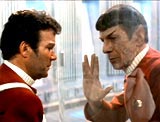
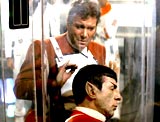



|

|
Star Trek III: The Search for Spock
(1984)
- the startling, upsetting death
of Genesis planet hostage Dr. David Marcus (Merritt Butrick), who
was stabbed in the throat by a Klingon on orders from treacherous
Klingon Captain Kruge (Christopher Lloyd)
- Admiral James T. Kirk's
(William Shatner) stunned reaction to the news of the death of his
son Dr. David Marcus, delivered to him by Lieut. Saavik (Robin Curtis):
("Admiral,
David is dead") --
Kirk stumbled backwards to the floor when trying to sit in his captain's
chair on his own hijacked starship USS Enterprise,
and croaked with anguish: ("You Klingon bastard. You've killed
my son. Oh! You Klingon bastard. You've killed my son! You
Klingon bastard")
|


|

|
Starman (1984)
- the eloquent speech by dying
alien Starman (Oscar-nominated Jeff Bridges) to SETI scientist Mark
Shermin (Charles Martin Smith) while trapped in federal custody in
a restaurant: ("We
are interested in your species...You are a strange species, not
like any other, and you would be surprised how many there are. Intelligent
but savage. Shall I tell you what I find beautiful about you? You
are at your very best when things are worst")
- hostage-turned-lover Jenny Hayden's (Karen Allen)
plea to Mark Shermin: ("Let him go, Mr. Shermin, please. If
he stays here, he'll die. Can't you see he's dying now?"). After
Shermin agreed to help the Starman escape rather than having him
captured and vivisected by the Army, Jenny gave a 'thank-you' kiss
to Shermin - imitated by the Starman
- the scene of the dying Starman's
farewell to Jenny in the
middle of Arizona's Barringer Crater - the rendezvous point where
he was met by an alien search party from above that would take him
from Earth forever. Jenny begged to go with him: ("Take
me with you"), but was not permitted,
since he knew she would die on his planet: ("I cannot...You will
die there"). He requested a 'human' goodbye that she had taught
him: ("Now,
tell me again how to say goodbye"), and she gave him a simple
reply: ("Kiss me and tell
me you love me"). She was saddened: ("I'm never gonna see
you again, am I?"). He requested: ("Tell the baby about
me"), and gifted her
with his last small silver sphere: (Jenny: "What should I do
with this?" Starman: "The baby will know").
- the final lingering shot of Jenny's face as the
healed Starman departed on his starship to return home, to the sounds
of Jack Nitzsche's swelling score
|







|
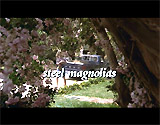
|
Steel Magnolias (1989)
 #20 #20
- the upsetting scene in which
Shelby Eatenton Latcherie (Julia Roberts) collapsed into a diabetic
coma - discovered by her husband Jackson Latcherie (Dylan McDermott)
as her 1 year-old son Jack, Jr. (C. Houser) screamed in horror.
- Shelby's
mother M'Lynn Eatenton's (Sally Field) round-the-clock vigil (humming "Mockingbird" to
her, reading beauty tips from a fashion magazine, etc.)
- the
scene of mourning M'Lynn's musings about death and the moment that
Shelby died (when everyone else had left after the machine was turned
off): ("Shelby, as you know, wouldn't want us to get mired down
and wallow in this. We should handle it the best way we know how
and get on with it. That's what my mind says. I wish somebody would
explain it to my heart...I find it amusin'. Men are supposed to be
made out of steel or somethin'. I just sat there. I just held Shelby's
hand. There was no noise, no tremble, just peace. Oh God. I realize
as a woman how lucky I am. I was there when that wonderful creature
drifted into my life and I was there when she drifted out. It was
the most precious moment of my life")
- M'Lynn's angry delivery of a post-funeral
speech at the injustice of her daughter's death: ("I'm fine!
I can jog all the way to Texas and back, but my daughter can't! She
never could! Oh God! I'm so mad, I don't know what to do! I wanna
know why! I wanna know WHY Shelby's life is over! I wanna know how
that baby will ever know how wonderful his mother was. Will he EVER
know what she went through for him? Oh, God, I wanna know whyyyy!
Whhhyyyyy?! Lord, I wish I could understand. No! No! No! It's not
supposed to happen this way. I'm supposed to go first. I've always
been ready to go first. I don't think I can take this. I don't think
I can take this. I just wanna hit somebody til they feel as bad as
I do! I JUST WANNA HIT SOMETHING! I WANNA HIT IT HARD!"). The
sequence was humorously undercut by Clairee's (Olympia Dukakis)
cathartic offer of her sour-puss best friend Ouiser Boudreaux (Shirley
MacLaine) as a punching-bag target for M'Lynn's anger: ("Here,
hit this! Go ahead, M'Lynn. Slap her!")
|






|

|
Stella Dallas (1937)
 #19 #19
- the touching, famous sequence of
devoted mother Stella (Barbara Stanwyck) and her daughter Laurel (or "Lollie")
(Anne Shirley) waiting at her unattended birthday party - removing plates
as regrets were received until they were the only ones at the festivities
- the train berth scene in which Stella's caring
teenaged daughter came down to "cuddle" with her mother who had overheard criticisms
(about being "a common looking creature for a mother")
-
the unforgettable final wedding scene with Stella's reactions as she
was standing alone in the rain at the outer gate gazing lovingly and
adoringly - with tears in her eyes (and biting a handkerchief in her
mouth) - through the mansion's window at her daughter's high-society
wedding - as the gathering crowd was told by a policeman to move along
- and afterwards, her joyful stride down the street as the film faded
to black
|



|

|
Stuart Saves His Family (1995)
- the heart-rending unsuccessful rehabilitation
scene for the nasty, hard-drinking and abusive Dad (Harris Yulin)
of effeminate Public Access Cable TV self-help guru-host Stuart
Smalley (Al Franken)
- the touching final scene in which Stuart's bullying,
under-achieving, pot-smoking older brother Donnie (Vincent D'Onofrio)
unexpectedly showed up at the studio on Christmas Eve after having
fled his dysfunctional life at home with their parents, as Stuart
was talking to his best friend and Al-Anon sponsor Julia (Laura San
Giacomo): (Julia: "We're gonna have
a great Christmas" - Stuart: (seeing Donnie) "The best ever!")
|


|

|
Summer of '42 (1971)
- the recounting, in flashback, of a young teen's coming-of-age
on 1940s Nantucket Island during war-time
- the tearjerking romance and sexual awakening by young 14 year-old teenager Hermie (Gary Grimes) with lonely, beautiful
22 year-old neighboring war bride Dorothy (Jennifer O'Neill) after
she had learned by telegram that her husband had been killed in action.
With tears in her eyes and slightly drunk, she put her head on Hermie's
shoulder, slowly danced (barefooted) with him to the tune (the film's
theme song) playing on a phonograph record, and tenderly kissed him
a few times before beckoning him to her bedroom for comfort (and to
gently make love). After
he left her that evening, that was the last time he saw her
- the next day, she left a note for Hermie (on her
beach house door), explaining (in voice-over) that perhaps the meaning
of the event would come to him in time: ("Dear Hermie: I must
go home now. I'm sure you'll understand. There's much I have to do.
I won't try and explain what happened last night because I know that,
in time, you'll find a proper way in which to remember it. What I
will do is remember you. And I pray that you be spared all senseless
tragedies. I wish you good things, Hermie. Only good things. Always,
Dorothy"), to the swelling sounds of Michel Legrande's theme
music
- the final bitter-sweet voice-over from the Narrator,
middle-aged Herman Raucher (voice of Robert Mulligan): ("I was
never to see her again. Nor was I ever to learn what became of her.
We were different then. Kids were different. It took us longer to
understand the things we felt. Life is made up of small comings and
goings. And for everything we take with us, there is something that
we leave behind. In the summer of '42, we raided the Coast Guard
station four times, we saw five movies, and had nine days of rain.
Benji broke his watch, Oscy gave up the harmonica, and in a very
special way, I lost Hermie forever")
|





|
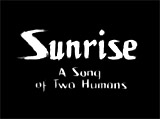
|
 Sunrise (1927)
Sunrise (1927)
- the scenes of the loving reunion
of the farmer/husband (George O'Brien) and his presumed-drowned wife
(Janet Gaynor) after she had been found alive but unconscious - he
rushed to his wife's bedside in the farmhouse where they were joyously
reunited. He attentively sat by his wife's bedside, where she slept
with their infant until the dawn's light appeared - she opened her
eyes and smiled at him with an angelic face and long-flowing hair
after releasing her tight bun. She opened her eyes and turned her
head on the pillow toward her husband. Their lips slowly drew together
for a kiss, dissolving into the bright rays of an art-deco sun filling
the screen.
- the word "Finis"
floated upward to take the place of the sun as the music dramatically
swelled
|

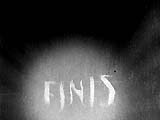
|
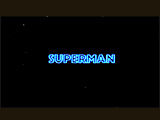
|
Superman
The Movie (1978) (aka Superman)
- Superman's (Christopher Reeve) discovery of a dead
Lois Lane (Margot Kidder) after tumbling into a crevasse while in
her car during a nuclear warhead-induced earthquake - he reacted
by pulling her out of the car and laying her onto the ground, and
upon realizing her demise, and his inability to save her, he inarticulately
spoke: "Why?
Why? Why? Why?", before heart-stoppingly howling with a primal
scream
- in reaction, Superman flew directly straight up
into the air to attempt to change the past - to circumnavigate
the globe at light-speed to reverse time in order to bring Lois
back to life
|




|

|
The Sweet Hereafter (1997,
Canada)
- the distressing, long-shot image at the mid-point
of the film of a yellow schoolbus filled with children, in British
Columbia (Canada), skidding off a slippery
and snowy road, sliding down an embankment onto a frozen lake,
and falling through the cracking ice due to its weight - and the effects of the tragic
accident (resulting in the deaths of 14 children) and subsequent
lawsuit and trial on the families and residents of the Canadian
town
|


|
